Public policy advocacy requires that people of faith be informed, not just well meaning
Valuing families means valuing everyone, the Rt. Rev. James Waggoner Jr., bishop of the Episcopal Diocese of Spokane, told an interfaith gathering at the Eastern Washington Legislative Conference.
He wrapped up sessions in which advocates and workshop leaders from faith communities gave information on legislation before the Washington State Legislature. The topics are ongoing concerns of the faith community.
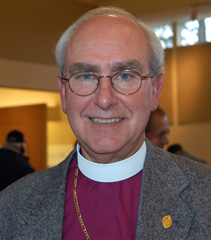 |
| The Rt. Rev. Jim Waggoner |
Jim emphasized the need to be informed, not just well-meaning on concerns presented—hunger, health care, affordable housing, mental health, water resources, human trafficking, tax fairness, environmental sustainability, mental health, energy assistance, welfare, Darfur in Sudan and Colombia.
The theme, “Valuing Families,” carries the assumption that all families value a roof over their heads, food on their tables and good health care.
Alice Woldt of the Washington Association of Churches (WAC), Paul Benz of the Lutheran Public Policy Office (LPPO) and Matt Muckler of the Washington State Catholic Conference (WSCC), presented motives and bills.
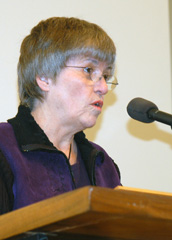 |
| Alice Woldt |
Alice said churches are called to serve the less fortunate: “Government has a role in creating a just society, so that there will be fewer people needing charity. It’s important in the Northwest where few are churched,” she said.
Because policies and the economy in the last four years have decreased housing affordability, increased hunger and reduced health care access, poverty has increased, she said.
Alice, who formerly taught second grade, told of a farm-worker’s son who fell asleep in class every day. She said some children fell asleep if they were up late watching TV, but she heard his stomach growl. He was 12 years old, small for his age because of malnutrition. He could not learn because he was hungry.
“It’s not okay for children to go to bed or to school hungry or to go without meals in the summer. Children cannot learn if their stomachs are empty,” said Alice.
“We have a biblical mandate to feed the least of our brothers and sisters, yet food insecurity and hunger have been trending up since 1999, with one in six people hungry in 2004,” she reported, telling of bills that would eliminate co-pays for school breakfasts, increase per meal reimbursements and return support for the summer meal programs.
She added concern about tax fairness in Washington, noted for its regressive tax system, in which the poorest pay 18 percent of their income in taxes and the wealthiest pay just three percent.
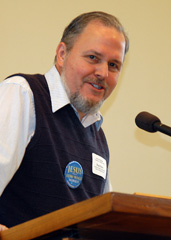 |
| The Rev. Paul Benz |
Paul, LPPO director for 23 years, knows people want to exercise their faith in the public arena in the LPPO’s six policy priorities: 1) hunger and poverty, 2) housing and health care, 3) economic and criminal justice, 4) environment and sustainable agriculture, 5) advocacy and human rights, and 6) the state tax structure.
“Our hands—writing to express our voices with pens or keyboards, or calling on a phone—are the hands of God,” he said.
Four health-care issues pending are 1) ending a waiting list for children’s health care, 2) repealing premiums, 3) adding 1,000 slots to the Basic Health Plan for low-income people and 4) adopting the Fair Share program, requiring employers of more than 5,000 people to provide health care.
He also told of bills to recycle electronic products, establish biologically intensive organic agricultural research at Washington State University, remove PBDE flame retardants in clothing and develop biofuels.
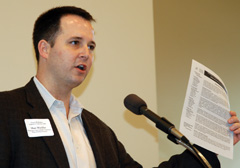 |
| Matt Muckler |
Matt, of the WSCC, reported on a plan to increase funding for the Housing Trust Fund, including services for domestic violence, mental health and drug addiction. One bill calls for ending homelessness by 2020.
“The underlying cause of housing problems is low wages, so we support HB 2657 to establish a living wage for public contract jobs,” he said.
Matt also expressed the WSCC’s concern about payday lending, threats to borrowers and repayment plans, urging capping loans at $500, rather than $700, and interest at 36 percent.
Diana Gibson, advocacy action coordinator for the Interfaith Council, said, “People of faith care about people. One way to express that caring is to know how to influence public policy.”
She joined Amnesty International while in middle school and wrote letters on behalf of people imprisoned or tortured for their beliefs or nonviolent actions.
“There I was at 13, writing someone in power—presidents of countries—to make a decision on behalf of a person. I was an advocate, saying here’s who I am, what I value and what I want to be done,” she said.
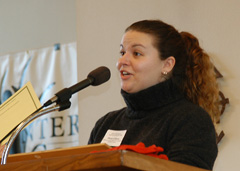 |
| Diana Gibson |
Diana, who is available to train congregations, summed up ways to influence policy: meet with legislators, be informed through email networks, write letters, send emails and phone legislators.
Scott Cooper, director of parish social services with Catholic Charities, challenged participants to form and meet regularly with groups in congregations to keep informed, energized, grounded in faith and accountable to act.
With many advocacy networks and urgent issues, he urges following a discerning process:
1) Gather information, discuss it with a group and act.
2) Look at history and today—who has power and money, who benefits and who pays.
3) Reflect theologically, so action is based on teachings and faith, not partisan politics.
4) Learn options, contact leaders and evaluate results.
Diana said persistence is crucial: “Even after an apparent defeat, we need to keep up the work,” she said.
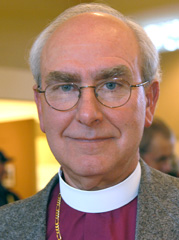 |
| Bishop Jim Waggoner |
In his comments, the Episcopal bishop challenged people of faith to know who they are, what they do and why they do it.
Each family, Jim said, represents different experiences, cultures and practices, but shares the bond of being a family member and having a place at the table.
Even an uncle who lacks social skills, talks too much, drinks too much and dominates discussions at family gatherings has a place in the family “because he is a member of the family,” he explained.
“We need to expand acceptance and inclusion to see each person as a member of the human family, the family God has given us, valued because of that, not because of race, religion or gender, regardless of birthplace or birthright, whether Muslim, Buddhist, Jew, Hindu or Christian,” Jim said.
In Christian tradition, he said, after Jesus gave the commandment to love God and love neighbors, someone asked Jesus, “Who is my neighbor?” Jim believes Jesus’ parable reply asks: “Who is not your neighbor?”
“Close or far, everyone who inhabits the earth is our neighbor—those God sends us,” Jim said, adding that it may be someone we least want to be with.
The Episcopal prayer book poses the question: “Will you respect the dignity of every human being?”
“Real respect,” Jim commented, “begins when I recognize that every person has a relationship with God.”
Because tolerance may mean indifference, he calls for moving from tolerance to appreciation of diversity and disagreements.
“That defies arrogance. No one church, nation, religion or community has all the truth. We can be enriched and enlightened by being with all, valuing people as family and acting in ways that say every individual has value,” Jim said. “We must also hold each other to compassion and concern.”
Beyond valuing each other, he asserts that people of faith have a responsibility.
“Whether our neighbor has bread is a spiritual matter for us. It’s obscene that we have more than enough resources to feed, house and provide health care for everyone, but do not do it.
“We do not lack resources, we lack respect and the will to act,” Jim said. “It’s not about budgets, but about changing our hearts, being informed and committed, and choosing love over fear.”
For information, call 329-1410.
By Mary Stamp - The Fig Tree - © February 2006




